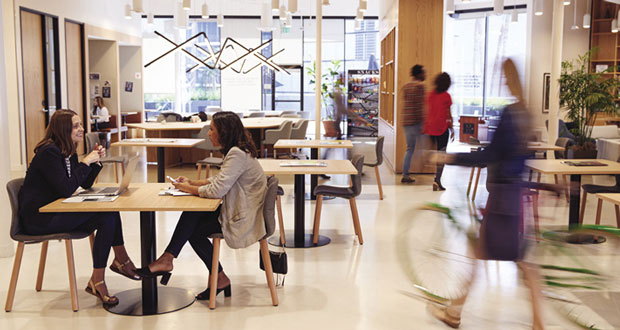The office is critical to doing business, says three quarters (72 per cent) of decision makers, despite the fact that hybrid work will become the dominant model, according to JLL’s global Future of Work Survey. The report also predicts that organisations will be looking across their real estate portfolios to re-think their office spaces, invest in new technology and prioritise sustainability.
“The next three years will prove to be an inflection point for real estate as businesses plot their future path and rethink the purpose of their portfolio,” said Dr. Marie Puybaraud, Global Head of Research, JLL Work Dynamics. “The changes accelerated by the pandemic represent an opportunity to pause, think about a long-term real estate strategy and how it aligns with future business priorities.”
The mass adoption of hybrid work will have a lasting impact, with 77 per cent of CRE leaders agreeing that offering remote or hybrid working will be critical to attracting and retaining talent in the future. As the trend toward dynamic working continues, successfully operationalising hybrid working will be the most important strategic priority for commercial real estate (CRE) executives over the next three years. This includes exploring flexible space options, with 43 per cent of companies planning to accelerate investment in flexible space between now and 2025, and 51 per cent saying they will lease flexible space through a third-party provider.
“As the office finds a new purpose post-pandemic as a destination for collaboration in employees’ hybrid workstyles, occupiers will need to continue increasing their investments in creative spaces,” said Cynthia Kantor, Chief Client Value & Growth Officer, JLL Work Dynamics. “Enhancing socialisation, especially among a large, often geographically dispersed, workforce will be critical to future talent strategies, as the office accelerates its role as the innovation hub of the work ecosystem.”
Forty-five percent of organisations consider collaboration to be one of the primary purposes of office space and 73 per cent have planned or are planning to make all office spaces open and collaborative, with no dedicated desk spaces. Many companies are also investing in spaces that support new workforce priorities around health and wellbeing.
As organisations face ever increasing pressure to deliver clear outcomes in the race to net zero and create social value through real estate, 77 per cent say investing in quality space is a priority. With green strategies having a direct impact on real estate decisions, 74 per cent say they are likely to pay a premium for green credentials; further, more than half of occupiers (56 per cent) plan to do so by 2025.
However, stakeholder aspirations are not solely environmental, with nearly 8 out of 10 companies saying their employees expect their workplaces to have a positive impact on society. This means increasing investment in social considerations will be equally as important as funding environmental objectives. With diversity, inclusion and wellbeing now falling high on the corporate agenda, companies are underpinning these objectives with further investment and resources. Seventy-nine percent of respondents agree that their organisations are acting today to make the workplace more inclusive and diverse for all employees.





